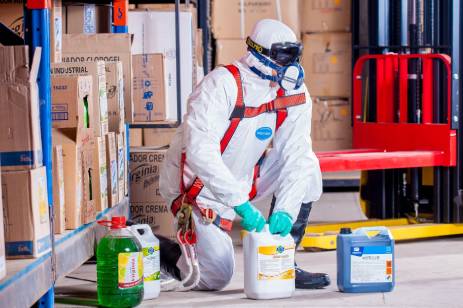Essential Practices for Handling and Storage.
Chemicals are ubiquitous in modern society, used in everything from cleaning products to industrial processes. While they are incredibly useful, they also pose significant risks if not handled correctly. This blog aims to provide essential information on chemical safety, covering best practices for handling, storing, and disposing of chemicals safely.
Understanding Chemical Hazards
Chemicals can be hazardous in various ways. They can be toxic, corrosive, flammable, reactive, or even explosive under certain conditions. Understanding the specific hazards associated with each chemical is crucial. This information is typically found on the Material Safety Data Sheet (MSDS) for each chemical.
General Safety Tips for Handling Chemicals
- Read Labels and MSDS: Always read the labels and the Material Safety Data Sheet before handling any chemical.
- Use Appropriate Personal Protective Equipment (PPE): Depending on the chemical, this may include gloves, goggles, aprons, or respirators.
- Work in Well-Ventilated Areas: To avoid inhaling fumes, always work in well-ventilated areas when handling chemicals.
- Never Mix Chemicals: Mixing chemicals can cause dangerous reactions. Always follow guidelines for chemical compatibility.
Storing Chemicals Safely
Proper storage of chemicals is as important as handling them safely.
- Store in a Cool, Dry Place: Most chemicals need to be stored in a cool, dry place away from direct sunlight.
- Use Appropriate Containers: Store chemicals in containers designed for chemical storage, and ensure they are clearly labelled.
- Segregate Incompatible Chemicals: Some chemicals can react violently if they come into contact with each other. Always segregate incompatible chemicals.
Disposing of Chemicals
Proper disposal of chemicals is critical to prevent environmental contamination.
- Follow Local Regulations: Always dispose of chemicals according to local regulations.
- Never Pour Down the Drain: Unless specifically directed, never pour chemicals down the drain.
- Use Hazardous Waste Disposal Facilities: Utilize local hazardous waste disposal facilities for disposing of chemicals.
Chemical Spill Management
Knowing how to deal with a chemical spill is essential for safety.
- Have a Spill Kit Ready: Always have a spill kit available in areas where chemicals are used.
- Evacuate and Ventilate the Area: If a spill occurs, evacuate the area and ventilate it if possible.
- Contain and Clean Up Spills Immediately: Use appropriate materials from the spill kit to contain and clean up the spill.
Conclusion
Chemical safety is a critical aspect of working with or around chemicals. Understanding the hazards, employing safe handling and storage practices, and being prepared for emergencies are key to preventing accidents and injuries. Always stay informed and cautious when dealing with chemicals, and remember, safety is a shared responsibility.
In a world where chemical use is inevitable, being vigilant about chemical safety ensures not only personal well-being but also the protection of the environment and the community at large.











 LOOKING FOR A JOB?
LOOKING FOR A JOB?